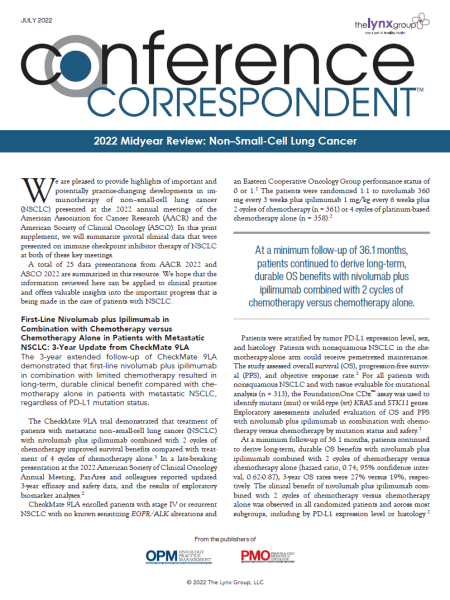BACKGROUND: The phase 3 FLAURA clinical trial of patients with advanced non–small-cell lung cancer (NSCLC) and epidermal growth factor receptor (EGFR) mutation showed that those who received the third-generation tyrosine kinase inhibitor (TKI) osimertinib had significantly longer progression-free survival (PFS) and overall survival than patients who received a comparator EGFR-TKI. This primary analysis led the US Food and Drug Administration to approve an extended indication for osimertinib as first-line treatment for advanced NCSLC with EGFR mutation. However, the overall survival data were too immature at the time of publication. The researchers noted that, “Understanding resistance mechanisms after first-line treatment and determining appropriate therapies on the basis of molecular-resistance profiles remain important considerations.” This report provides the overall survival data from the planned updated analysis of overall survival in the FLAURA study.
METHODS: FLAURA was a randomized, double-blind, phase 3 clinical trial that included 556 patients with treatment-naïve advanced NSCLC and an EGFR mutation (exon 19 deletion or L858R allele). The patients were randomized in a 1:1 ratio to osimertinib 80 mg once daily or to 1 of 2 other EGFR-TKIs—gefitinib 250 mg once daily or erlotinib 150 mg once daily.
RESULTS: The median overall survival (the secondary end point) was 38.6 months with osimertinib versus 31.8 months with the comparator drugs (hazard ratio for death, 0.80; P = .046). At 3 years, 28% and 9% of patients, respectively, continued to receive the drug regimen. At the time of data cutoff, the median duration of exposure to treatment was 20.7 months in the osimertinib group and 11.5 months in the comparator group. There were 116 of the 656 patients who had central nervous system (CNS) metastases at study entry, and their overall survival was similar to that in patients without CNS metastases. In addition, 54% of patients in the osimertinib group were alive at 3 years versus 44% of patients in the comparator group. The rate of grade ≥3 adverse events was 42% in the osimertinib group and 47% in the comparator group.
“First-line treatment with osimertinib was associated with significantly longer overall survival than treatment with comparator EGFR-TKIs in patients with EGFR mutation-positive, locally advanced or metastatic NSCLC and had a similar safety profile,” the researchers suggested.
Source: Ramalingam SS, Vansteenkiste J, Planchard D, et al. Overall survival with osimertinib in untreated, EGFR-mutated advanced NSCLC. N Engl J Med. 2020;382:41-50.
Commentary by Robert J. Ignoffo
In a previous analysis of the FLAURA study, the hazard ratio for disease progression or death was 0.46), regardless of T790M mutation status.1 The new phase 3 clinical trial has shown that osimertinib is one of the most effective treatments to date for advanced NSCLC with sensitizing EGFR-positive status. In its guidelines for the treatment of NSCLC (version 3.2020), the NCCN designated osimertinib as the preferred first-line drug in this setting. This study showed a long period of follow-up of 39 months in both groups, and, in the osimertinib group, a 6.8-month longer median survival, a 20% lower mortality risk, and 3 times as many patients who continued receiving osimertinib compared with the comparator group. Of note, osimertinib treatment is effective in patients with CNS metastases. Regarding the safety of osimertinib, most adverse events in the study were grade 1, and serious adverse events occurred in 27% of the patients in both groups.
In another study of subsequent therapy, patients who had disease progression with another EGFR inhibitor (ie, erlotinib, gefitinib, or afatinib) had increased PFS for much longer than patients who received chemotherapy.2
Osimertinib is a very effective treatment for EGFR mutation–positive advanced NSCLC and deserves its first-line treatment status.
- Soria J-C, Ohe Y, Vansteenkiste J, et al; for the FLAURA Investigators. Osimertinib in untreated EGFR-mutated advanced non–small-cell lung cancer. N Engl J Med. 2018;378:113-125.
- Mok TS, Wu Y-L, Ahn M-J, et al; for the AURA3 Investigators. Osimertinib or platinum–pemetrexed in EGFR T790M–positive lung cancer. N Engl J Med. 2017;376:629-640.

